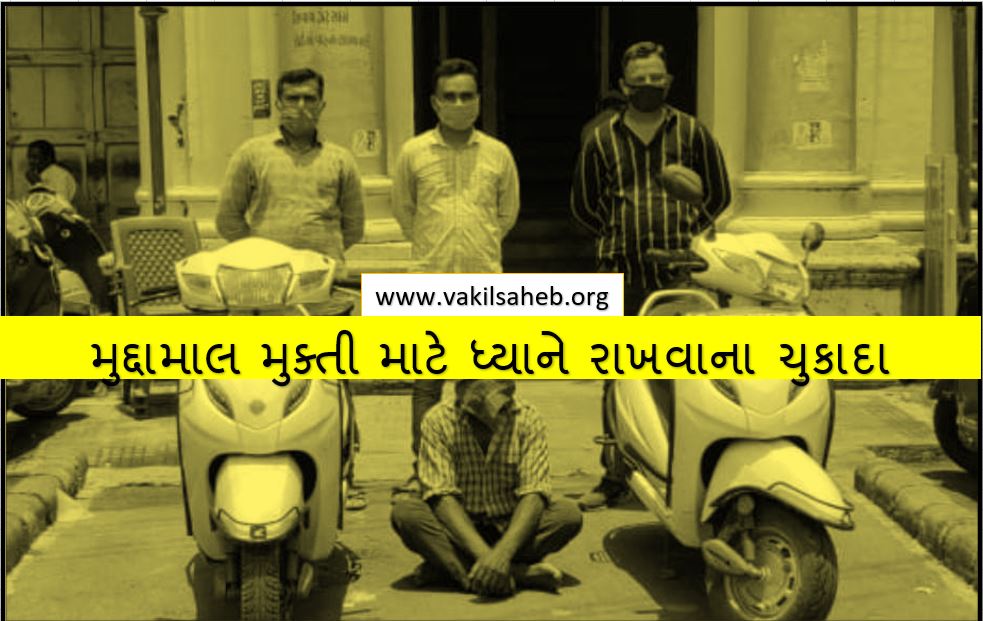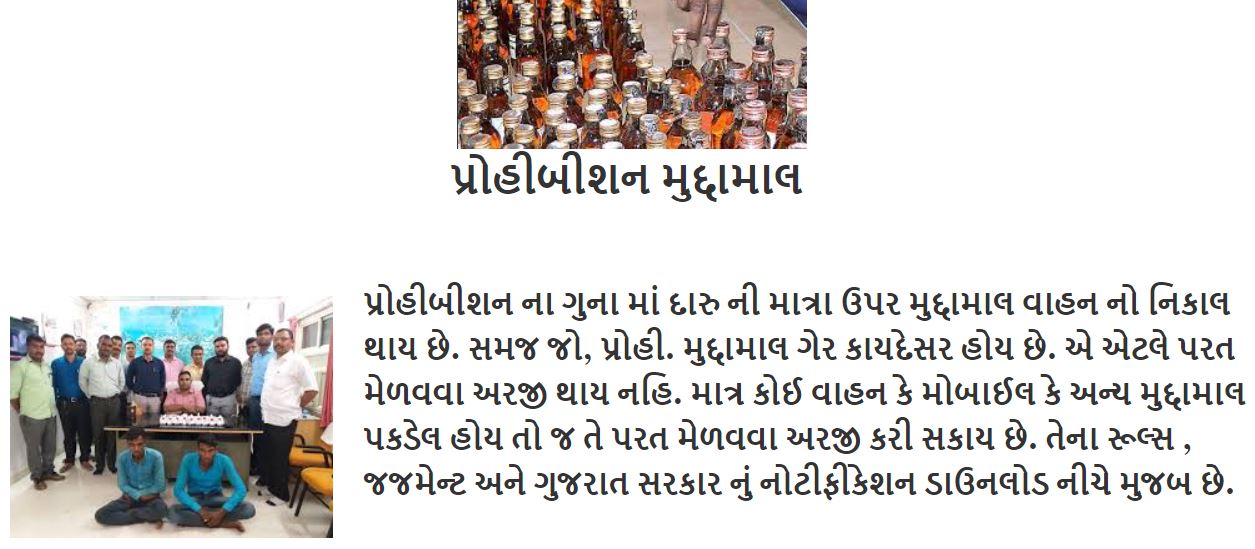
Disposal of Property – Muddamal Application is treated to be urgent Matter :- Supreme Court.
Every Lawyer must know about it. The Provisions Regarding Muddamal under chapter 34 of the Criminal Procedure Code Section 451 to 459 besides the provisions , the criminal rules of practice and Circular order provide rules 220 to 334. (www.vakilsaheb.org)
Property :-
(a) Property of any kind or document which is produced before the court or which is in its custody.
(b) any property regarding which an offence appears to have been committed or which appears to have been used for the commission of any offence.
When such property is involved in commission of an offence, or is the subject matter of an offence, the same is known as case property.
Muddamal Application is Now Urgent Matter :- Gujarat High Court During Corona Lockdown.
Click on Below Link to Get the Answer of Following Questions.
- Read Provisions
- Read Criminal Rules for Practice
- Crpc Section 451, Muddamal Application format in Gujarati Language – Download 🙂
- (www.vakilsaheb.org)
Crpc Section 451, Muddamal Application format in Gujarati Language – open
Very Important Case.
Sundarlal Ambalal Desai Vs State of Gujarat
The Hon’ble Apex Court in the Case , Succinctly explained the object and scheme of the various provisions of the code as to disposal of case property. The Hon’ble Supreme Court , in the above case , observed as follows :
” The object and scheme of various provisions of the code appear to be that where the property which has been the subject matter of an offence is seized by the police, it ought not to be retained in the custody of the court or of the police for any time longer than what is absolutely necessary.”
In View of the ratio laid down by the Honble Apex Court , It is clear that unless the case property is necessary, court cannot retain the property either in tis custody or inthe custody of the police for any time longer. Therfore, it is the duty of court to pass appropriate property orders according to law without any delay.
To avoid such a situation, the powers under Section 451 Criminal Procedure Code should be exercised promptly and at the earliest. In that regard, the observations of the Hon’ble Supreme Court in Sunderbhai Ambalal Desai vs State Of Gujarat (3rd supra) are very much relevant
which read thus:
1) Owner of the article would not suffer because of its remaining unused or by its misappropriation.
2) Court or the police would not be required to keep the article in safe custody;
3) If the proper Panchnama before handing over possession of article is prepared, that can be used in evidence instead of its production before the Court during the trial. If necessary, evidence could also be recorded describing the nature of the property in detail; and
4) This jurisdiction of the Court to record evidence should be exercised promptly so that there may not be further chance of tampering with the articles.
In case, where such articles are not handed over either to the complainant or to the person from whom such articles are seized or to its claimant, then the Court may direct that such articles be kept in bank lockers. Similarly, if articles are required to kept in police custody, it
would be open to the Station House Officer that after preparing proper Panchnama to keep such articles in a bank locker. In any case, such articles should be produced before the Magistrate within a week of their seizure. If required, the Court may direct that such articles be handed over back to the Investigating Officer for further investigation and identification, However, in no set of circumstances, the Investigating Officer should keep such articles in custody for a longer period for the purpose of investigation and identification.
Important observations of the Hon’ble Supreme Court in the case of Sundherbai Ambalal Desai (3rd supra) with regard to the VEHICLES SEIZED: “It is of no use to keep suchseized vehicles at the police stations for a long period. It is for the Magistrate to pass appropriate orders immediately by taking appropriate bond and guarantee as well as security for return of the said vehicles, if required at any point of time. This can be done pending hearing of applications for return of such vehicles. In case where the vehicle is not claimed by the accused, owner, or the insurance company or by third person, then such vehicle may be ordered to be auctioned by the Court. If the said vehicle is insured
with the insurance company then insurance company be informed by the Court to take possession of the vehicle which is not claimed by the owner or a third person. If Insurance company fails to take possession, the vehicles may be sold as per the direction of the Court. The Court would pass such order within a period of six months from the date of production of the said vehicle before the Court. In any case, before handing over possession of such vehicles, appropriate photographs of the said vehicle should be taken and detailed panchnama should be prepared.”
Open :- PRECAUTIONS WHILE TAKING PANCHNAMA
SMT Basawakom Dyanmangouda Patil Vs State of Mysore and Another
(www.vakilsaheb.org)
High Court and the Sessions Judge proceeded on the footing that one of the essential requirements of the code is that the articles concerned must be produced before the Court or should be in its custody. The object of the code seems to be that any property which is in the control of the Court either directly or indirectly should be disposed of by the Court and a just and proper order should be passed by the Court regarding its disposal. In a criminal case, the police always acts under the direct control of the Court and has to take orders from it at
every stage of an inquiry or trial. In this broad sense, therefore, the Court exercises an overall control on the actions of the police officers in every case where it has taken cognizance.”
The Court further observed that where the property is stolen, lost or destroyed and there is no prima facie defence made out that the State or its officers had taken due care and caution to protect the property, the Magistrate may, in an appropriate case, where the ends of justice so
require, order payment of the value of the property.
Pareshkumar Jaykarbhai Brahmbhatt Vs. State of Gujarat – Special Criminal Appeal No. 8521/2017 – Para 65
Para 65: My final conclusion is that Section 98(2) of the Act, 1949 curtails the power of the Magistrate to order interim release of the seized vehicle under Sections 451 or 457 of the Cr.P.C., as the case may be. The Courts below will have no jurisdiction to order interim release pending the trial of the seized vehicle in connection with the offence under the Act, 1949, if the quantity of the liquor recovered exceeds 10 litres in quantity.
Pera – 66 The Legislature in its wisdom has prescribed a methodology to deal with the prohibition offences, seizure, confiscation, release etc. Once such a procedure is prescribed , the courts have to examine the rights of the parties in accordance with the procedure so prescribed. I am unable to hold that the magistrate and revisional court have committed any error in rejecting the applications preferred by the respective applicants under section 451 or 457 of the Cr.P.C in view of the provisions of section 98(2) of the Act, 1949 the general provisions laid down in Sunderbhai Ambalal Desai Vs State of Gujarat 2002 10 SC 80) cannot be pressed in to service for release of vehicle from the court of Magistrate.
98. Things liable to confiscation. – (1) Whenever any offence punishable under this Act has been committed,
(a) any intoxicant, hemp, mhowra flowers, molasses, materials, still, utensil, implement or apparatus in respect of which the offence has been committed,
(b) where, in the case of an offence involving illegal possession, the offender has in his lawful possession any intoxicant, hemp, mhowra flowers or molasses other than those in respect of which an offence under this Act has been committed, the entire stock of such intoxicant, hemp, mhowra flowers or molasses,
(c) where, in the case of an offence of illegal import, export or transport, the offender has attempted to import, export or transport any intoxicant, hemp, mhowra flowers or molasses, in contravention of the provisions of this Act, rule, regulation or order or in breach of a condition of licence, permit, pass or authorisation, the whole quantity of such intoxicant, hemp, mhowra flowers or molasses which he has attempted to import, export, or transport,
(d) where in the case of an offence of illegal sale, the offender has in his lawful possession any intoxicant, hemp, mhowra flowers or molasses other than that in respect of which an offence has been committed, the whole of such other intoxicant, hemp, mhowra flowers or molasses, shall be confiscated by the order of the Court.
(2) Any receptacle, package or covering in which any of the articles liable to confiscation under sub-section (1) is found and the other contents of such receptacle, package or covering and the animals, carts, vessels or other conveyances used in carrying any such article shall likewise be liable to confiscation by the order of the Court, [but it shall not be released on bond or surety till the final judgment of the Court where the quantity of the seized liquor is exceeding the quantity as may be prescribed by the rules.
“The Gujarat Prohibition (Liquor sample & determination of quantity seized liquor) Amendment Rules 2019 Dated 6th Nov. 2019 wherby Gujarat Prohibition Act, 1949 – No. GG/65/2019/VDR/10/2009/2061/E-1 :- In the exercise of the Powers conferred by section 65AA of the Gujarat Prohibition Act, 1949 (Bom,XXV of 1949), The Government of Gujarat hereby specifies the quantity of intoxicant to be twenty liters
Download the Official Gazzetted Notification
RELIED ON THE FOLLOWING JUDGEMENTS:
1. Sunderbhai Ambalal Desai vs State Of Gujarat, 2002 Supp(3) CR 39
2. Smt Basawa Kom Dyanmangouda patil vs State of Mysore and another [1977] 4 SCC 358
3. Rajalingam Vs. Vangala Venkata Rama Chary ( 1996(2) ALD (Crl) 868)
4. Muthaiah Muthirian Vs. Vairaperumal Muthirian (AIR 1954 MADRAS 214


